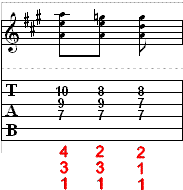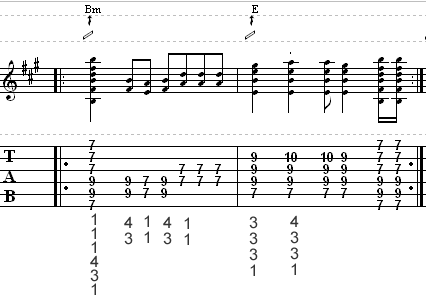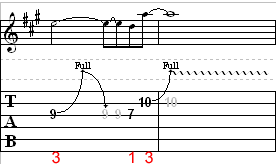Back in the day, Alice Cooper had a killer band that made musically complex shock rock. This song is no exception. It’s a great little song with some nice guitar parts. You may well remember Megadeth’s remake of “No More Mr. Nice Guy”.
1st Intro Riff
Using triads, open strings, a slide, and pull-offs, this riff is pretty fun to play.

Here’s what it sounds like at full speed (122 bpm):
Here are the suggested fingerings for the 3 triads:

If you can’t play this riff at full tempo, try playing along with the audio sample below. It’s at about 75 bpm:
2nd Intro Riff
After the first intro riff is played 4 times, the song moves on to the next theme which includes 3 guitar parts. 2 of the guitar parts are rhythm parts and the 3rd is a lead guitar part.
The 1st rhythm guitar strums a Bm and E chord each for one measure and then repeating. You can see it labeled at the above the staff. You could very well play this on an acoustic and electric. The 2nd guitar part is a little more complicated. It plays around with the pentatonic minor in the 1st measure after the Bm barre chord is strummed and adds suspended 4th to the E chord in the 2nd measure. Again, with
this riff, you can use your electric or acoustic. Unplugged Alice Cooper, anyone?
Below are the two rhythm guitar parts:

Here’s what it sounds like at regular tempo:
Here are the suggested fingerings:

Once again, here is the track at a much slower 75 beats per minute:
Lead Guitar
The lead guitar part requires that you can perform full step bends with vibrato. It’s a slow-moving lead, so even a beginner guitar players should be able to give it a try:

Here’s the lead with the backing band:
All the notes require only the 1st or 3rd finger. For example, for notes on the 9th and 10th frets use your 3rd finger and for the notes on the 7th frets, you can use your 1st finger. When bending the notes
on the 9th and 10th string, use your 1st and 2nd finger for support by placing them right behind the 3rd finger when pushing the string up. See the video below for more info.

Here it is at about 75 bpm:
